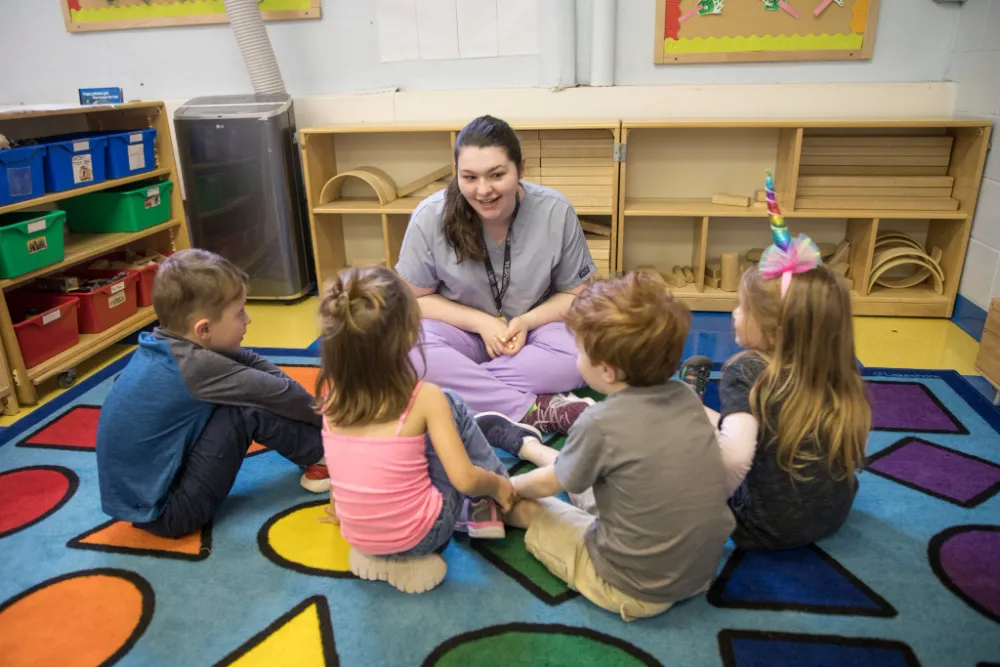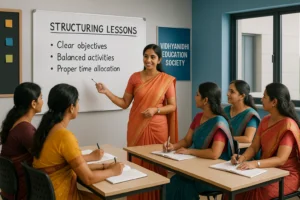
Source: media
While discussing the NEP 2020 the word DECE frequently pops up. DECE meaning is Diploma in Early Childhood Education a program that trains budding aspirants to undergo training in strategic expertise and teaching pedagogies that are suitable for fostering the holistic development of the child.
DECE meaning has a wide approach and the program comprises various theoretical modules as well as practical training coverage for conducting pre-primary classrooms effectively.
This program focuses on various crucial aspects:
- Child Development and Psychology
- Classroom Management Techniques
- Curriculum Planning
- Parent-Teacher Collaboration
- Inclusive Education
Understanding DECE isn’t just beneficial for educators; it’s also valuable for parents and guardians looking to provide a strong educational foundation for their kids. Moreover, the program offers insights into the latest teaching methodologies and educational technologies that are designed to enhance children’s cognitive, emotional, and social growth. Through hands-on training and theoretical modules, this diploma opens doors to rewarding career opportunities in nurseries, preschools, and daycare centers.
So, if you’re interested in shaping the future by influencing young minds positively, gaining an in-depth understanding of “DECE Meaning” could be your first step towards achieving that goal. Stay tuned as we explore this subject matter in more detail to give you a well-rounded view.

Source: northeastmetroteach
DECE Course Scope
The Early Childhood Education sector is a booming sector and since it is being prioritized by the government agencies the DECE Course Scope is only going to widen increasing the numerous opportunities to make an impact.
Here are some career options:
Lead Educator in Pre-Primary
Assume the role of a primary instructor in a Pre-Primary setting at top schools, shaping the young minds of tomorrow.
Childcare Business Owner
Run your preschool center or become a franchise partner in an existing network.
Child Welfare Associate
Join forces with NGOs concentrating on child betterment and be part of positive change.
Early Learning Facilitator
Use play-based learning strategies to encourage balanced growth in children attending quality kindergartens.
Nursery Support Staff
As a secondary teacher in a nursery, help to create an innovative learning environment for young children.
If you’re interested in our programs, contact us at +919869546913 / +919869866277.
To access our brochure Click Here.
DECE Course Online
As CPD or continuous professional development is a crucial element for everyone upgrading qualifications in Early childhood education is a must for better job prospects and greater credibility while applying for higher positions.
Join VES’s DECE Course Online mode if you’re looking to upgrade your qualifications in early childhood education and aspire to make a difference in the lives of young learners.
Innovative Study Material
Our course content is designed to equip you with the most recent approaches in early childhood education.
Cost-Efficiency
Since the course is online, you don’t need to worry about commuting expenses.
Adaptable Study Timeline
Fit the course into your busy schedule with our self-paced learning options.
Commitment-Friendly
Accommodate your other personal and work-related obligations while pursuing the course.
Expert Course Advisor
You’ll have a knowledgeable course coordinator to assist with any queries.
Practical Fee Range
Get the most value for your money with our affordable tuition costs.
Payment Ease
Tuition fees can be broken down into manageable increments for convenience.
Diverse Payment Solutions
Enjoy the freedom to select a payment option that suits you best.

Source: childrenschoicepreschool
DECE Course Details
No matter your academic background, the DECE Course has an accommodating structure.
The particulars of some pivotal DECE Course details are as follows:
- The one-year UG Diploma is geared toward high school graduates.
- A two-year PG Diploma is for those who have earned a Bachelor’s degree with a 55% average or higher.
- Learning options: In-person lectures, mail correspondence courses, or internet-based sessions.
DECE Course Duration
The DECE Course duration varies depending upon the choice of program the trainee chooses. A Fast Track option is also available to shorten your academic journey.
- For students who just graduated from high school, there is a one-year undergraduate diploma.
- For individuals having an undergraduate degree, the two-year Postgraduate Diploma is offered.
- Use the Fast Track mode for a quicker path to your diploma.
DECE Study Material
VES’s DECE course is a specialized training program that guides aspiring educators in how to nurture all-around development in young children, making learning an enjoyable experience for them.
The DECE Study Material or Course Topics for Diploma in Early Childhood Education:
- Psychology Specific to Pre-school Age Children
- Understanding Developmental Milestones: Cognitive, Physical, Emotional, Social
- Recognized Teaching Models from Renowned Educators
- Practical Aspects of Running a Preschool
- Essential Language and Literacy Skills
- Phonetic Learning Approaches
- Ensuring Classroom Inclusivity
- Exploration Through Art and Craft
- Physical Activities and Basic Dance Moves
- Engaging Children with Rhymes, Stories, and Music
The DECE meaning of Early Childhood Education is covered in-depth in the modules of the DECE Course giving ample exposure to practical sessions of handling a preschool classroom.
ECCEd Course Fees
Looking to pursue teaching as a long-term career? At VES, we provide excellent training at a price you can afford.
For making the course a pocket-friendly course we have priced our ECCed Course fees at a price which is easily affordable by everyone.
Our flexible fee structures, along with a range of payment options like GPAY or online transfers, make the entire process stress-free.
If you’re interested in our programs, contact us at +919869546913 / +919869866277.
To access our brochure Click Here.
DECE Course Jobs Salary
If you’re a certified DECE educator, promising opportunities await you in Indian preschools. Your salary could be affected by the geographic location of the school and your expertise. DECE Course Jobs Salary commonly ranges from 20,000 to 30,000 INR a month, although international schools often pay more. For a strong foundation in this fulfilling career, consider VES’s Early Childhood Programs.
Courses for Teaching after 12th
As the educational landscape evolves, the need for well-qualified teachers, administrators, and special educators has never been higher. Vidhyanidhi Education Society (VES) has consistently aimed to fill this gap by offering a wide array of teaching courses tailored to meet the industry requirements. With an emphasis on quality, innovation, and practical application, each course is designed to prepare you for real-world challenges in the educational field.
Listed below is a list of courses for teaching after the 12th:
Diploma and PG Diploma in Teacher Training
Diploma in Early Childhood Care and Education (ECCE)
Geared toward equipping teachers for preschool settings, focusing on developmental needs and instructional strategies for young children.
Post Graduate Diploma in Early Childhood Education (PGD-ECE)
An advanced course aimed at those seeking leadership roles or administrative positions in the field of early childhood education.
Diploma in Learning Disability
Designed for educators and caregivers working with children who have learning disabilities, focusing on diagnosis, intervention, and support.
Diploma in Special Educational Needs (SEN)
Tailored for those interested in working with children who have unique learning requirements, providing strategies for differentiation and inclusion.
Certificate in Shadow Teacher Training
Aimed at training individuals to assist children with special needs in mainstream schools, providing academic and emotional support to ensure their successful integration.
School Administration and Management Courses
Diploma in School Administration and Management
A short-term course aimed at equipping professionals with the managerial skills needed for smooth school operations.
Diploma in Educational Administration & Management
Suited for those looking to take up managerial roles in educational institutions, covering topics like finance, HR, and policy-making.
Phonics Teacher Training Program
Designed for teachers looking to specialize in the teaching of phonics, emphasizing reading and spelling techniques that make learning easier for children.
Grammar Teacher Training Programme
Aimed at educators looking to enhance their English language teaching skills, focusing on effective ways to teach grammar to students of all age groups.
By offering such a broad spectrum of courses, Vidhyanidhi Education Society is making significant strides in enhancing the quality of education. Every course is created to be useful, efficient, and specifically relevant to your profession in the field of education.

Source: tootris
What Does an Early Childhood Educator Do?
A educated specialist in the educational and developmental requirements of young children, generally those between the ages of birth and eight, is known as an early childhood educator (ECE). Depending on the environment, which might range from preschools and childcare facilities to family homes and community groups, the function of an early childhood educator can change.
However, some of the core responsibilities remain relatively consistent across different settings:
Developing Curriculum and Implementation
Educational Activities
Design and implement a curriculum that is both age-appropriate and stimulates learning.
Skill Development
Focus on various skills, including motor skills, social skills, emotional development, and basic academic skills like counting, letter recognition, etc.
If you’re interested in our programs, contact us at +919869546913 / +919869866277.
To access our brochure Click Here.
Observation and Assessment
Child Assessments
Regularly evaluate children’s performance to ensure they are meeting developmental milestones and learning objectives.
Tailoring Instructions
Modify teaching methods or materials to suit individual needs.
Interaction and Guidance
Classroom Management
Maintain a safe, clean, and engaging classroom environment.
Communication
Foster good communication between children, and between children and adults.
Discipline
Implement effective discipline strategies to manage behavior.
Collaboration and Communication
Parents
Regularly communicate with parents about their child’s progress and any concerns or suggestions.
Colleagues
Work collaboratively with other teachers and staff members.
Community
Sometimes coordinate with other community resources, such as libraries and health services, to enrich the educational experience.
Professional Development
Training
Attend workshops, conferences, and other professional development opportunities to stay updated on early childhood education best practices.
Certifications
Maintain any required certifications or licensures.
Safety and Health
Basic Care
In some settings, especially childcare centers, educators may also be responsible for basic care, such as feeding, diapering, or resting arrangements.
First Aid
Administer basic first aid as required and ensure the safety of the children at all times.
Record-Keeping
Documentation
Maintain accurate records of children’s progress, attendance, health information, and other relevant data.
The methods and activities Early Childhood Educators use are often based on educational theories and developmental psychology. Giving kids an atmosphere where they can conduct themselves freely, explore, and learn while playing is a main prerogative for laying a foundation for the child’s social and academic growth
What does it mean to be an Early Childhood Professional?
An Early Childhood Professional has a very determining role to play in the all-round development of the child, especially during the early childhood period i.e. from birth to 8 years. As the early formative years mark rapid brain development offering the child the right experiences is a significant line of work that an early childhood professional has to do.
Here are some key aspects of being an Early Childhood Professional:
Child Development Knowledge
Early Childhood Professionals have a thorough understanding of a child’s phases of physical, emotional, and social growth.
Educational Preparation
In early childhood education or a similar discipline, many practitioners in this sector have formal education and training. They get the information and abilities necessary to design activities and curricula that are developmentally appropriate thanks to this education.
Nurturing and Caring
For young children, they offer a secure and supportive atmosphere. This entails attending to their fundamental requirements, such as feeding and diapering them, as well as protecting their emotional health.
Effective Communication
Early childhood professionals must interact with kids, parents, and coworkers efficiently. They should be able to convey information about a child’s progress, concerns, and educational plans clearly and compassionately.
Observation and Assessment
They observe and assess children’s behavior and development to identify any potential issues or areas where additional support may be needed. This information helps tailor educational approaches to individual needs.
Curriculum Planning
Early Childhood Professionals create and implement developmentally appropriate curricula that foster children’s intellectual, social, and emotional growth. They design activities and lessons that engage children in active learning.
Inclusion and Diversity
Inclusion is essential in the varied culture of today. To ensure that all children have an equal chance to learn and succeed, early childhood professionals should be attentive to cultural variations, special needs, and different learning styles.
Professional Development
It’s crucial to keep up with the most recent findings in early childhood education research and best practices. Professionals may improve their abilities and keep current with changing approaches and technology by participating in ongoing professional development.
Advocacy
A common aspect of the work is advocating for young children’s rights and well-being. This might be taking part in legislative debates, joining organizations for professionals, or getting involved in neighborhood projects that promote early children’s education and care.
Ethical Standards
Early Childhood educators are expected to maintain professionalism while dealing with children, parents, and other stakeholders giving prime importance to the child’s best interests.
To lay a solid basis for children’s achievement and lifelong learning requires a blend of knowledge, skills, and empathy.
“Join the DECE course at VES and make a lasting impact on young lives.”
If you’re interested in our programs, contact us at +919869546913 / +919869866277.
To access our brochure Click Here.
DECE Meaning
FAQs
What is DECE Course?
DECE stands for Diploma in Early Childhood Education a job-oriented program offered by Vidhyanidhi Education Society focusing on skills for teaching preschoolers.
What is DECE Qualification?
DECE qualification requirements include a minimum of 12th-grade completion and being at least 18 years old to enroll in the course.
What is the Scope of DECE?
The scope of DECE covers roles in pre-primary schools, daycare centers, and NGOs. It opens doors to positions like teacher and coordinator.



